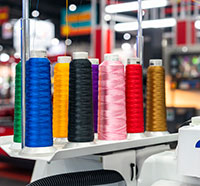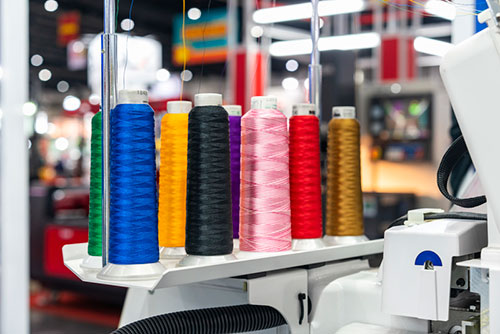"Automation not only enables apparel manufacturers to design multiple styles in short runs but also manage stock levels, improve delivery times and boost the quality and consistency of garments. The latest era of automation ‘Industry 4.0’ includes a host of innovations from industrial-scale ‘Internet of things’ and augmented reality, to machine-to-machine communication in knitting machines, and 3D printing."
 Automation not only enables apparel manufacturers to design multiple styles in short runs but also manage stock levels, improve delivery times and boost the quality and consistency of garments. The latest era of automation ‘Industry 4.0’ includes a host of innovations from industrial-scale ‘Internet of things’ and augmented reality, to machine-to-machine communication in knitting machines, and 3D printing.
Automation not only enables apparel manufacturers to design multiple styles in short runs but also manage stock levels, improve delivery times and boost the quality and consistency of garments. The latest era of automation ‘Industry 4.0’ includes a host of innovations from industrial-scale ‘Internet of things’ and augmented reality, to machine-to-machine communication in knitting machines, and 3D printing.
Just as in the rest of the world, automation is also taking root in Bangladesh, especially in many of its mass-market manufacturing factories from where top global apparel brands source. Factors like customisation and quick delivery are driving demand for better and more sophisticated automation in these factories. Customers are also demanding granularity, with more and more bespoke designs. For instance, Fung Group has been experimenting with customised shirt-making, made to measure garments that use a digital scan of a person’s body.
Increasing labor costs driving automation
One factor driving demand for automation is increasing labor costs. For instance, Chinese apparel firm Tianyuan Garments has invested more than $20 million in a factory in Little Rock, Arkansas in the US. Though the factory has a staff of 400 laborers, it also uses 24 robots capable of producing one T-shirt every 30 seconds without any need for human intervention. Similarly, sportswear giant Adidas has developed highly automated speed factories that boast production speeds by three times.
Garments has invested more than $20 million in a factory in Little Rock, Arkansas in the US. Though the factory has a staff of 400 laborers, it also uses 24 robots capable of producing one T-shirt every 30 seconds without any need for human intervention. Similarly, sportswear giant Adidas has developed highly automated speed factories that boast production speeds by three times.
Barriers in growth of automation
However, despite various benefits, the process of automation is not yet widespread as automated machines and equipment are expensive and their reconfiguring and redesigning requires time and skills. The pay-off associated with digitising processes proves to be too far off for most manufacturers, especially in an uncertain economic environment. Changing business models also pose a challenge for automation as brands may demand customised products today but tomorrow their demands may change.
A negative impact on employment
While automation increases speed and efficiency, it negatively impacts labor and employment. As a recent McKinsey study reveals, automation will result in the loss of around 800 million jobs worldwide by 2030, with the garment sector of Bangladesh being particularly badly hit. Another study by the Bangladesh government suggests that the increasing adoption of automated knitting machines, robotic auto-coners, automatic chemical and dye dispensers are likely to result in a loss of five million jobs in the next t 15 years. Around half a million people that operate single and double needle lockstitch sewing machines in Bangladesh will be out of work by 2041, with many smaller factories being hardest hit financially.
Adopting a responsible approach
The challenge for the textiles sector therefore is to find a responsible approach to automation that ensures workers are not left behind. This involves training workers to upskill and be relevant as new equipment is introduced. Sarah Krasley, Founder of fashion technology company Shimmy proposes providing people with digital literacy skills to enable them to work side by side with machines – and bringing brands, manufacturers, agencies and technology providers together to work on education, skills development and R&D.












